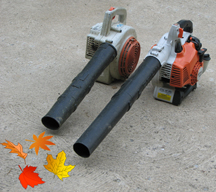The Leaf Blower Study Committee (LBSC) is using a two-pronged approach to curb the use of gas-powered leaf blowers in town: educating residents and coming up with a bylaw to limit the use of the machines that it will propose to Town Meeting in 2015.
The LBSC was formed in 2012 to study the use of leaf blowers, which members say are noisy and contribute to air pollution both from exhaust and the particles of dust and debris they blow into the air. They are used many months of the year not just to move fallen leaves but also to clean dirt, sand and debris from paved surfaces. The Lincoln Board of Health issued a statement last spring saying that noise, particulate matter and vapors from leaf blowers “represents significant potential health hazards.”
The LBSC has also organized demonstration events to encourage residents to seek out effective, economically viable alternatives to gas-powered leaf blowers. These include leaf mulching, sustainable landscaping and electric equipment.
“We want to educate people on the health and environmental impacts of gas-powered leaf blowers, as well as find pragmatic solutions. Our goals are to protect our health and environment, and preserve Lincoln’s rural character,” said LBSC chair Jamie Banks. “We hope that clean and quiet will become the new norm when it comes to landscape maintenance in Lincoln,” says Banks.
Leaf blowers are often used by landscaping companies hired by residents, a practice that the LBSC aims to reduce by encouraging residents to hire from a list of “quiet contractors” the group compiled on its website. A survey of town residents by the LBSC found that 80 percent of residents hear leaf blowers used by landscape contractors hired by a neighbor. Of the 228 people who took the survey, 54 percent said they weren’t bothered or were bothered only a little by leaf blower noise, but 19 percent said “quite a bit” and another 27 percent said they were bothered “a lot.”
The LBSC expects to propose regulations of gas-powered leaf blowers similar to those in other towns, including:
- Brookline — prohibits their use except between March 15 and May 15 and from September 15 to December 15, though the rule does not apply to the town and its contractors.
- Arlington (Article 12, Section 3D) — prohibits their use from June 15 to September 15 except for emergencies such as storm cleanup, and also allows their use only on weekdays from 7:30 a.m. to 5:30 p.m. and on Saturdays from 8 a.m. to 4 p.m.
- Cambridge (Chapter 8.16.081) — prohibits their use except between March 15 and June 15 and between September 15 and December 31. They are also prohibited on Sundays and most holidays, as well as at times other than 8 a.m. and 5 p.m. (Monday through Friday) and 9 a.m. and 5 p.m. (Saturdays, Columbus Day and Veterans’ Day).
In the LBSC survey, 43 percent of respondents said there should be town limits on the use of leaf blowers. Asked what limits should be imposed (respondents could choose more than one), 17 percent favored a ban on all blowers, 27 percent said gas blowers should be banned, and 19 percent said they should be banned on hard surfaces, while 29 percent said there should be no limits on the use of leaf blowers.

Leave a Reply